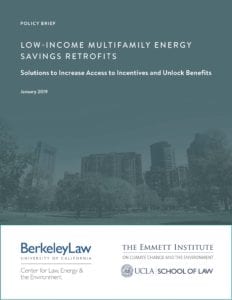June 2019
Improving the energy performance of existing buildings will be key to achieving California’s efficiency and greenhouse gas emission goals. But owners and residents of low-income, multifamily buildings face some of the greatest obstacles, including difficult access to capital, complex financing arrangements, competing renovation needs, and a split incentive problem that limits owners’ financial interest in upgrades that primarily reduce residents’ utility bills.
While California’s energy regulators and electric utilities fund and operate a number of incentive and rebate programs, structural barriers have hampered progress, including strict income qualification criteria, energy data opacity, and the complexity of combining multiple incentives into one project.
To address these challenges, UC Berkeley and UCLA Schools of Law convened two stakeholder groups to identify policy solutions to address key barriers, increase access to energy efficiency incentives, and unlock environmental, financial, and quality-of-life benefits for owners and residents alike. The law schools are now releasing a policy report, Low Income, High Efficiency that details the solutions developed in these convenings, including:
- Creating a single, statewide “one-stop shop” efficiency program administrator to comprehensively manage incentives and offer users a single point of access.
- Expanding innovative financing mechanisms such as “pay as you save” and third-party “energy budget” arrangements that take advantage of residents’ utility bills and private capital.
- Creating a comprehensive database to help prioritize retrofit projects and support energy data benchmarking and analysis efforts.
You can download the report here to see the full range of policy solutions and case studies.
Watch the webinar
Hosted by CLEE’s Ethan Elkind and Ted Lamm, and featuring California Energy Commissioner Andrew McAllister, Peter Armstrong of Wakeland Housing, and Martha Campbell of the Rocky Mountain Institute.
For More Information:
Contact Ethan Elkind, Director of the Climate Program at CLEE or Ted Lamm, Research Fellow in the Climate Program

 Download our 2019 policy brief
Download our 2019 policy brief